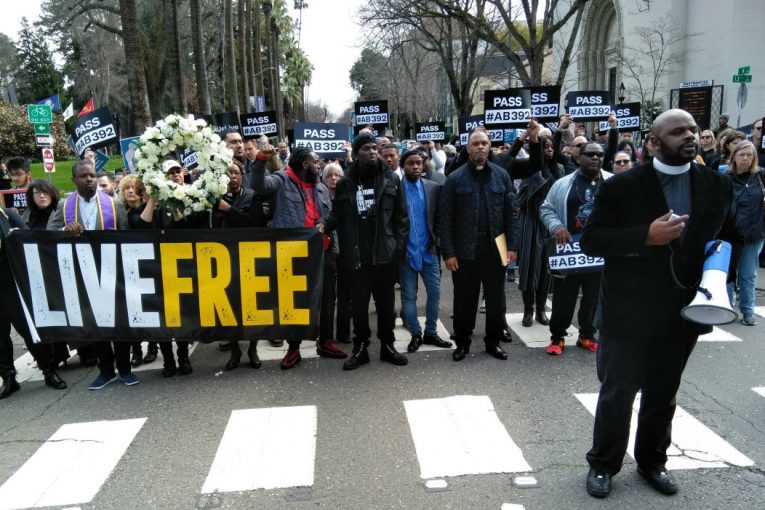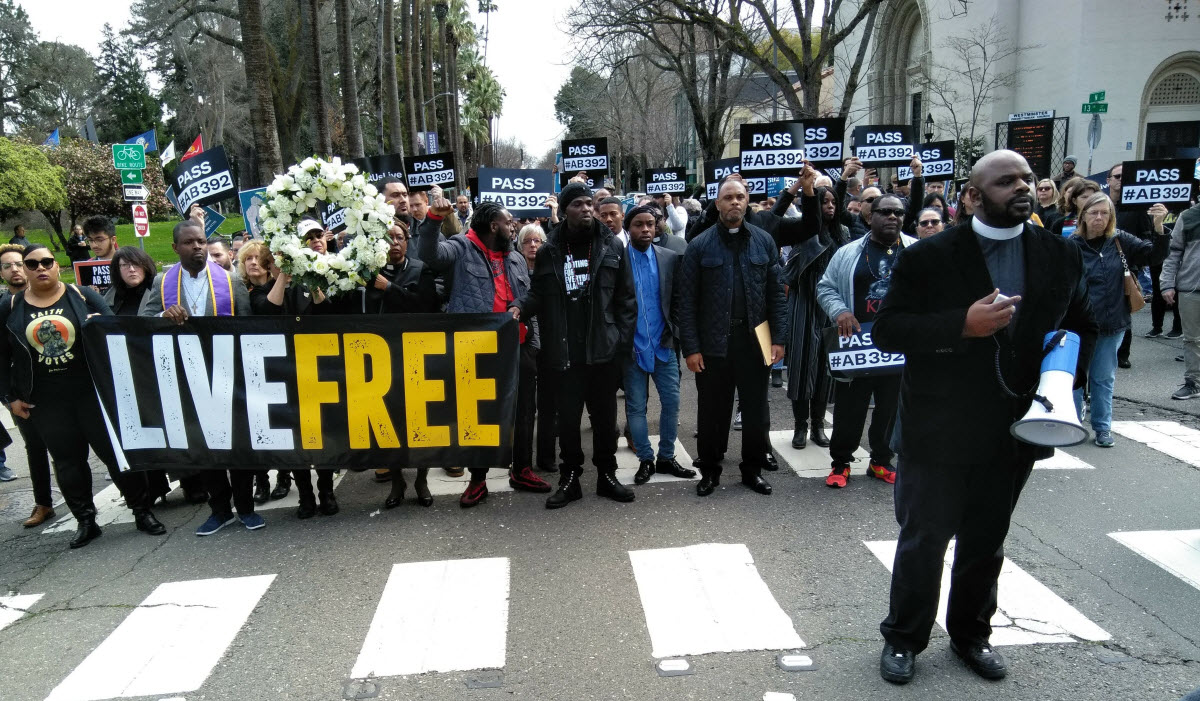

If people want to understand better the impact of the protests against the Sacramento DA and AG’s office over the failure to bring forward criminal complaints against the officers, we should look to the fate of AB 931 in 2018.
Like the current bill, AB 392, the bill authored by Assemblymember Shirley Weber and Kevin McCarty was drafted in response to the shooting death of Stephon Clark While that bill would have changed use-of-force policies that would compel officers to exhaust all “reasonable alternatives,” such as de-escalation and less-than-lethal force before resorting to deadly force, it was not able to reach the Senate floor for a vote last year.
Given the new push and the protests, and the vocalized support from Governor Gavin Newsom, it seems far more likely that AB 392, authored by the same two legislators, will do far better – and perhaps even pass this time.
As a Bee editorial correctly points out: “District Attorney Anne Marie Schubert disappointed many when she declined to file charges against the officers who killed Stephon Clark. But here’s the hard truth: California’s current law regarding use of deadly force gives officers overly broad authority. Even if Schubert had filed charges, it’s unlikely they would have resulted in a conviction under current law.”
What we have seen time and time again in other communities is that it is rare for prosecutors to press charges for police shootings and even more rare for juries to convict. For every Jason Van Dyke, convicted of murdering Laquan McDonald, there are a whole host of other cases where charges were never brought (against the shooters of Michael Brown, Mario Woods, Tamir Rice, the killer of Eric Gardner and many others) – and even where charges are brought, they end up not convicting (in the case of Philando Castile there was an acquittal, while in the case of Walter Scott a hung jury and a federal plea agreement).
Even when they do convict, the officers are not necessarily doing a lot of time – see the cases of Laquan McDonald and Oscar Grant.
The lesson here is that the Bee is right – the law needs to change.
Assemblymember Kevin McCarty said recently that the Stephon Clark case “will have a big role.” As he put it, “It’s a worldwide story, and the people have seen the images with their own eyes. They see that there probably was an alternative to utilizing non deadly force.”
But, as we saw last year, even a shooting death may not be enough to change the law. You need to catalyze the movement. We will have to see if the renewed protests will be enough to induce legislators to buck the police officer unions. Remember, the vote will happen this summer after the fires have burned themselves out.
Attorney General Xavier Becerra has talked tough and stood tall in pushing back against Trump administration policies, but like his predecessor Kamala Harris, when it comes to police and prosecutorial misconduct and reform, he has been timid – at best.
The big difference between the AG and the Sacramento DA is that, while Mr. Becerra talked about the need to change the law, Ms. Schubert seems perfectly content with it. She took her time to attack Mr. Clark rather than fight to change the law.
Mr. Becerra at least said, “We must all be willing to write the next chapters in this story of what we call American justice” and he went so far as to pledge to engage with the legislature on proposals to change the law on the use of force.
But let us not give him too much credit here – he stopped short of endorsing AB 392 or even specifying which changes he would support.
In meantime, once again Bee columnist Marcos Breton deserves high marks for pushing for changes.
He made some interesting points in his most recent column, arguing that “no institutions in our communities have greater power than law enforcement. Why? Because law enforcement have the awesome power of being legally sanctioned to use deadly force in the line of duty. They even have that power when they guess wrong about a suspect, as city cops did with Clark.”
He makes an interesting point, but I would still go with the prosecutor who has the power to decide whether to bring charges and which charges to bring – there is no oversight over those decisions. Moreover, they can be wrong and not face any real consequences even if they hide or destroy evidence.
But still the point about the power of police and lack of oversight is well taken.
He also pushed back against those who argue “Clark caused his death by his actions.”
He pointed out that “nobody I know in law enforcement was happy with the outcome in the Clark case. He was breaking windows. He should have gone to jail that night for misdemeanor crimes. He went to the morgue.”
He also points out that, while it is true that Mr. Clark had a criminal record, the officers at the time they confronted him did not know that.
Writes Mr. Breton: “They didn’t know anything about him so you can’t suggest, as some have, that Clark’s prior actions informed how the police officers dealt with him. They didn’t. His prior actions only became known after he was dead. Why didn’t Clark obey commands? We don’t know, he’s dead. And you know what? There are examples in other cities of black men obeying police commands and still ending up dead. Google: Philando Castile.”
His solution: “I want all police agencies in California to re-train officers on use of deadly force. And on dealing with people who have emotional issues. And on de-escalating turbulent situations. I want law enforcement agencies to be more introspective about the implicit bias that officers have when dealing with people in high poverty neighborhoods.”
That seems like a good start. I also do not believe that the DA should be the investigating agency in officer-involved shootings. As it turns out, the AG’s office came to the same conclusion – and under existing state law, in a criminal sense, I think that is correct.
But as I have written before, criminal sanctions are probably not the only way to approach this. What we need to have is a better administrative review system as well – and a more transparent one to boot.
Would any of this have saved Stephon Clark? We will never know. The key is to stop the next shooting before it happens. What we are doing now is not working.
—David M. Greenwald reporting

